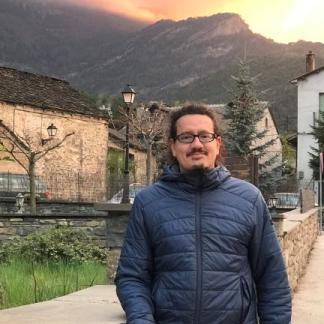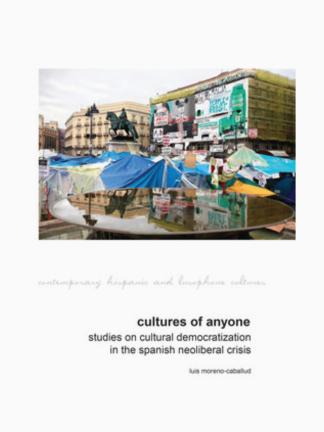Luis Moreno-Caballud
502 Williams Hall

My research interests include philosophy, literature, film, and cultural history. I specialize in modern and contemporary Iberian studies.
My work analyzes the relationship between the tradition of Western metaphysics and capitalism as a way of life. I study capitalism as an extension of the Western promise of transcendence, and of its parallel disavowal of finite, vulnerable, interdependent life.
One aspect of my work is a focus on the cultural transformations brought out by capitalism in Spain. I have studied representations of rural and peasant cultures in the context of the homogenization caused by so-called “economic modernization” during the Franco dictatorship and the transition to democracy.
I have also worked on the crisis of neoliberal capitalism in 2008, concentrating on an often-overlooked aspect of it: the breakdown of trust in technocratic and intellectual elites that it provoked. In my book, Cultures of Anyone. Studies in Cultural Democratization in the Spanish Neoliberal Crisis (Spanish version here), I built a philosophical and historical genealogy of the cultural authority of these technocratic and intellectual elites, and I also studied the emergence of collaborative and non-hierarchical practices in grassroots collectives during the crisis. I called these practices “cultures of anyone” because in them it is understood that culture, that constant collective discussion in which it is decided what constitutes “a decent life”, is something that anyone should be able to participate in.
My current book project is tentatively titled Form of Life. Artistic and Literary Explorations of a Non-Capitalist Existence. It studies the crucial role of aesthetics in displacing neoliberal subjectivities. I investigate three contemporary literary and artistic lines of flight: an animist line, which displaces the contemporary crisis of experience by questioning the Western dualism between subject and object; a feminist line, which understands the creation of imaginaries as one of the everyday necessary material activities that sustain life; and an equalitarian line, which confronts the privatization of artistic creation and tries to uncover the abundant capabilities that we suppress in ourselves when we enter into the logic of individualist cultural authority.
I also write fiction and non-academic articles for various publications. Some of this work can be found on this blog.
Academic Book
- Cultures of Anyone. Studies on Cultural Democratization in the Spanish Neoliberal Crisis. Liverpool: Liverpool University Press, 2015. Free download: here
- En español: Culturas de cualquiera. Estudios sobre democratización cultural en la crisis del neoliberalismo español. Madrid: Acuarela Libros, 2017. Descarga gratis: aquí
Edited Volume
- La imaginación sostenible: culturas y crisis económica en la España actual. Special Monographic Issue of Academic Journal Hispanic Review 80.4 (2012).
Academic Articles
- “Transplantando al pueblo. Genealogía y contradicciones del discurso franquista sobre el mundo rural” Hispanic Research Journal 17.6 (2016): 522-538.
- “La otra transición. Culturas rurales, Estado e intelectuales en la encrucijada de la ‘modernización’ franquista (1957-1973)” Arizona Journal of Spanish Cultural Studies 19 (2015): 111-128.
- "Forum: For Whom Do We Write? A Discussion about Format, Purpose, and Audience." Bulletin for Spanish and Portuguese Historical Studies 40.1 (2015): 139-155. With Sebastiaan Faber, Palmar Álvarez-Blanco, Cristina Moreiras-Menor, Simon Doubleday, and Benita Sampedro.
- “La evolución del ‘escritor de provincias’. Sabino Ordás y Luis Mateo Díez en la transición española a la democracia”. Bulletin of Hispanic Studies 92 (2015): 385-410.
- “Todo el año es carnaval. Tradiciones populares y contra-cultura en la transición española” Revista Kamchatka 4 (2014): 101-123.
- “Cuando cualquiera escribe. Procesos democratizadores de la cultura escrita en la crisis de la Cultura de la Transición española”. Journal of Spanish Cultural Studies 15.1-2 (2014): 13-36.
- “Looking Amid the Rubble. New Spanish Documentary Film and the Residues of Urban
- Transformation”. Studies in Spanish and Latin American Cinemas 11.1 (2014): 61-74.
- “Desbordamientos culturales en torno al movimiento 15M”. Teknokultura. Revista de Cultura Digital y Movimientos Sociales, 10.1 (2013).
- “La imaginación sostenible: culturas y crisis económica en la España actual”. Hispanic Review 80.4 (2012): 535-555.
- “Las relaciones interartísticas de vanguardia ante lo político. Un estudio sobre La Gaceta Literaria”. Revista Canadiense de Estudios Hispánicos 34. 3 (2011): 429-449.
- “Surco de perdición: las voces del pasado rural en la obra de Luis Mateo Díez”. Turia 93-94 (2010): 40-46.
- “Agrias culturas. Elementos para la reconstrucción de una memoria agro-urbana de la transición”. Germán Labrador-Méndez (ed) Mombaça Special Issue: Lo llamaban transición (2010): 33-39.
- “La ceguera de Cronos. Historia y tiempo en el cine de Víctor Erice”. Revista Hispánica Moderna 62. 2 (2009): 197-212.
- “Viaje al centro del horror. Surrealismo, humor y destrucción en La novela del indio Tupinamba, de Eugenio F. Granell”. Anales de la Literatura Española Contemporánea 34.1 (2009): 159-183.
- “Leyenda de una postguerra íntima: ética, memoria y narración en Fantasmas del invierno, de Luis Mateo Díez”. Siglo XXI: Literatura y Cultura Españolas 4 (2007): 253-265.
